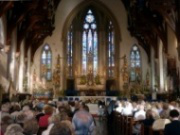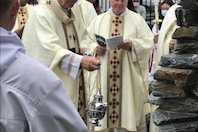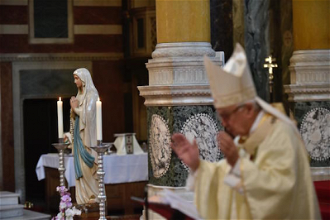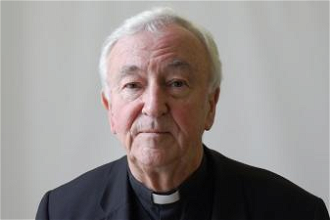Archbishop Nichols urges Catholics to be more confident in their faith

St Walburge's Church, Preston
As the start of the Year of Faith approaches, the Most Reverend Vincent Nichols, Archbishop of Westminster called on the congregation at the Preston Guild Mass on Saturday 1 September "to be more confidently Catholic in all we do".
"Being confidently Catholic means having confidence in the truth of faith, a truth which is held before us as a great gift from God..." he said. "This truth of faith is truth about ourselves, about our human condition, fallen and redeemed. It means the truth about God who, in infinite love and compassion, comes to us in the Incarnate Word so that we may never again be overwhelmed by the loneliness of thinking that all depends on us and therefore destined for oblivion."
During his homily at St Walburge's Church, Preston, Archbishop Nichols dwelt on the 2012 Preston Guild theme of "Looking back to look forward" saying that it is vital that "we deepen the roots of our faith so that we may be the bearers of its fruit". In doing so, he reflected on his own personal Lancashire Catholic heritage and how the lessons of the past can provide us with wisdom for the future.
Broadening his reflections to encompass Preston's historic wool trade which brought Preston its status as a guild market town in 1179, Archbishop Nichols said honesty was an endeavour, and described the example set then of honesty in business: "profit combined with wider purpose for the common good".
He also spoke of the wool merchants who migrated to Preston from Flanders in the 14th century and who enabled us to "learn together how to fashion a future for the benefit of all. "
Archbishop Nichols pointed out that faith too is for the common good; the benefit of all. " Referring to Pope's letter on the Year of Faith, Porta Fidei, he said we may "never think of belief as a private act" for "faith is choosing to stand with the Lord and so as to live with him" and be confidently Catholic in all we do.
To live with the Lord, is to share truth at the heart of faith, in all we do and with all whom we encounter. This means having a strong sense that of the truth of God. This is the joy and freedom which comes in relationship in faith with the Lord.
Archbishop Nichols concelebrated the Mass with the main celebrant, Bishop Campbell, Bishop of Lancaster. The congregation was made up of people for whom Preston is part of their past, present or future - bishops and priests who have or are serving in Preston, school children from local schools, and parishioners representing all of Preston's 17 parishes.
The guild status was awarded to Preston in 1179, and the festival is celebrated every 20 years, the last one being in 1992. Recent Guilds have taken on an ecumenical dimension with three Anglican Bishops present at Saturday's Mass together with eight Catholic Bishops.
The full text follows:
May I begin with some personal remarks. They are, as it were, part of my credentials! My mother's family were Lancashire Catholics. Her grandparents came from Little Crosby and Hall Road, for those of you who know West Lancashire. So I am blessed to have received a share of her robust Lancashire Catholic faith. But I have also learned about the particular distinctions and pride that can be found in matters of faith and kinship in this great county. As a young priest serving in Wigan, I heard an instructive story from an old Canon Campbell. He was instructing a young couple for marriage and said to the young man: "Well, young man, I have only one question to ask you. Do you love her?" "Love her?" he replied. "I've just walked from Chorley, ain't I!"
So Preston is not the only Lancashire town with its special sense of pride, but it certainly is the only one with this marvellous tradition of the Guild Festival. It is a great honour and joy for me to be here this evening and tomorrow, to share in this tradition, stretching back, as everyone knows to 1179.
Proud Preston! How that phrase echoes through these days, and rightly so. But, as I am sure you know, that phrase, first used in the 18th century, seems to have been attached to the PP which is part of Preston's shield or coat of arms. And I am sure you do not need me to remind you that those letters on the coat of arms actually stand for 'Princeps Pacis', the Prince of Peace, for above them stands the Lamb and flag, the emblem of the risen Christ carrying his banner of victory over death. Now there is a coat of arms of which you can be immensely proud!
My understanding is that the theme of this Preston Guild for 2012 is "Looking back to look forward". In this spirit the Festival 'will celebrate history and tradition whilst looking to the future', to quote the Leader of Preston City Council. And it is right to put in the forefront of that rich tradition the splendid emblem of this proud city.
And this is surely our project for today: that we become more deeply rooted in our faith, in its traditions and richness, so that we bear fresh fruit in our witness and service of this City and all its people. And in doing this we stand always beside and beneath this great image of the Lamb of God, Christ our Lord. He is the Prince of Peace, the one alone who can bring us, in his care and in imitation of his love, to that way of peaceful living for which our hearts so long.
The history of the Christian and Catholic faith is long and deep here in Preston. After all the very name of this city suggests its awareness of the things of God: Preston, the priest's settlement or home. And then you have, almost by way of illustration, your great patron saint, the priest and bishop St Wilfred.
Think of those long traditions: the deep desire, as seen in Wilfred, to hold on to what is true, with loyalty to the See of Rome as a key in that unending search for truth.
Think of the honesty endeavour in the wool trade which brought Preston its status as a guild market town as early as 1179. Honesty in business: profit combined with wider purpose for the common good. Now that is a quality which we need afresh today.
Think too of the welcome given by Preston to some of its early immigrants: the wool merchants who came here in large numbers from Flanders in the 14th century to bring their skills and their dedication to the shaping of its future. Even today we face the challenge of welcoming the stranger and learning together how to fashion a future for the benefit of all. But the lessons are there, in your proud history.
So we again we look back to look forward; we deepen the roots of our faith so that we may be bearers of its fruit.
What better opportunity than this Year of Faith which begins on 11 October and is a very special time in which we are to deepen our knowledge and understanding of the key themes of our faith, coming closer to the Lord. I urge all of us to make the most of this special opportunity and respond enthusiastically to the initiatives of the Diocese, parish by parish.
Pope Benedict has urged us to 'rediscover the joy of believing and the enthusiasm for communicating the faith' (Porta Fidei para 7), and he described the programme of the Year as one in which 'The Church as a whole and all her Pastors, like Christ, must set out to lead people out of the desert, towards the place of life, towards friendship with the Son of God, towards the One who give us life, and life in abundance.' In order to do this, he reminds us, we must be more directly concerned with the very substance of our faith, rather than 'the social, cultural and political consequences of the commitment of faith' because faith in God is no longer taken 'as a self-evident presupposition for life in society' (Porta Fidei para 2).
What can that mean for us today?
It means that we may 'never think of belief as a private act' for 'Faith is choosing to stand with the Lord so as to live with Him' (Porta Fidei para 10).
I suggest it also means a single phrase for us to keep in mind, this phrase: that we be more confidently Catholic in all we do.
Being confidently Catholic means having confidence in the truth of faith, a truth which is held before us as a great gift of God, a truth which we never possess of ourselves but rather seek simply to be possessed by it. This truth of faith is truth about ourselves, about our human condition, fallen and redeemed. It means the truth about God who, in infinite love and compassion, comes to us in the Incarnate Word so that we may never again be overwhelmed by the loneliness of thinking that all depends on us and therefore destined for oblivion.
St James has expressed this so clearly: "It is all that is good, everything that is perfect, which is given us from above; it comes down from the Father of all light; with him there is no such thing as alteration, no shadow of a change. By his own choice he made us his children by the message of the truth so that we should be a sort of first fruit of all that he had created. Accept and submit to the word which has been planted in you and can save your souls."
What a wonderful recipe by which to live: "Accept and submit to the word which has been planted in you." If we do that everyday then we will indeed be confidently Catholic.
What such acceptance and submission will teach us, of course, is that the truth of faith is to be found in a living and trustful relationship with Jesus Christ.
And this leads us to the second characteristic of being confidently Catholic: our search for holiness.
The beauty of holiness that we seek is the beauty that springs from the heart, from a relationship of love between each of us and the Lord, between the Church and its Head. It is this relationship, lived day by day, which gives Catholic life its poise and calm, its ability to repent which wrong has been done, its peaceful acceptance of itself as a Church for sinners which can also produce saints. As Pope Benedict said, in the reality of our lives and in the life of the Church, we live 'the unfathomable mystery of the interweaving of holiness and sin' (Porta Fidei 13). This is wonderfully expressed in the words of today's psalm with its pointed question: Lord, who shall dwell in your presence? The words of that psalm, which are a recipe of the virtuous life, have told us how to attain the stability and perseverance which we seek. The person who ponders those words and takes them to heart will stand firm in their love of the Lord, a love which will not be shaken to breaking point no matter what happens.
Then, finally, we come to the third quality of confidently Catholic life: that of showing forth the joy and the freedom which comes in that relationship in faith with the Lord.
Today we live in a culture which is rightly fascinated by the complexity, beauty, power and potential of the world around us. We are in thrall to all that can be achieved through our mastery of so much potential. We rightly strive to know the workings of this planet in all its depth, to master them and put them to good purpose. We strive to stretch the limits of knowledge, of communication, of every boundary which seems to hem us in. This is a great and proper enterprise.
Yet many aspects of the public culture of our age, within this very process, seems intent on rejecting every influence or claim that comes from beyond the horizons of this visible world, everything that appears not to gain legitimation from scientific and technological discovery. Such perspectives, as in religious belief and in every horizon of eternity, are not readily given their place in our public culture, whether in the form of prayer or religious symbolism. Yet life is more that the created world and reason is more than the consequences of observation and experiment. This truth presses upon us in so many ways. Happiness cannot be manufactured, quantified or purchased. Beauty summons us beyond its physical expression. Love takes us out of reason's reach. We know that God, who is the creative force in all that we treasure and want to possess, calls us to a fullness of live which is pure gift. It is in relationship with God, the God made visible in Jesus Our Lord that true joy and freedom are to be found. It is to this relationship that we are to be eloquent witnesses in our world today.
May this Preston Guild Mass and this Year of Faith make our relationship with the Lord increasingly firm 'since only in him is there the certitude of looking forward to the future and the guarantee of an authentic and lasting love.' (Porta Fidei para 15) This is the great lesson of the saints of our tradition and one which does indeed fashion us for the future.
All that we celebrate in this great Guild Mass is wonderfully summed up for us in its prayer - and beautifully expressed, if I may say so, in this new translation. Here it is again:
God of might, giver of every good gift,
Put into our hearts the love of your name,
So that, by deepening our sense of reverence,
You may nurture in us what is good,
And, by your watchful care,
Keep safe what you have nurtured.
Through Christ our Lord.
Amen.


















